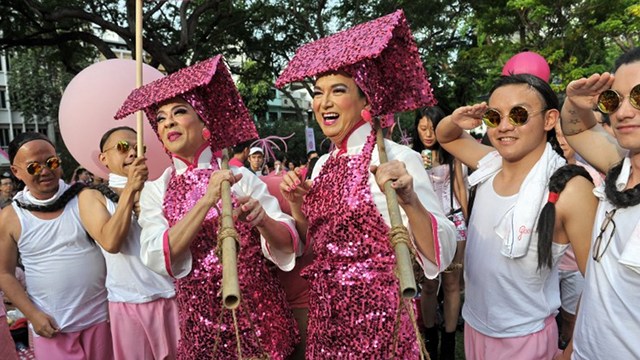SUMMARY
This is AI generated summarization, which may have errors. For context, always refer to the full article.

UNITED NATIONS – The United Nations joined Singapore’s gay community in criticizing a decision of a top court to uphold a law criminalizing sex between men.
The UN’s Office for the High Commissioner for Human Rights (OHCHR) said it is “disappointed” with the ruling of Singapore’s highest court to declare constitutional a law that sets a two-year jail term for men who engage in acts of “gross indecency” in public or private.
“The Office said using criminal law to prosecute individuals for engaging in consensual same-sex conduct violates a host of human rights guaranteed by international law, including the right to privacy and the right to freedom from discrimination,” read the statement issued on Friday, October 31.
On Wednesday, Singapore’s Court of Appeal ruled that the law banning and criminalizing sex between men is in line with the Constitution, and does not infringe on human rights. The court said it was up to parliament to repeal the British colonial era law.
The court rejected the appeal of 3 Singaporean citizens, including a gay couple in a relationship for 15 years, and a man who was arrested for allegedly engaging in oral sex with another man in a toilet cubicle in a mall in 2010.
The law first introduced in 1938 is not actively enforced. It does not target sex between female homosexuals.
Still, the UN said that the frequency of the law’s implementation does not justify its existence.
“While this law is rarely invoked in Singapore, it nonetheless codifies discrimination and contributes to societal stigma against individuals who are gay,” the Geneva-based OHCHR said.
It added, “The Office regrets that the courts have missed this opportunity to strike down this law.”
The UN’s statement echoed the sentiment of local activists including Pink Dot Sg, which organizes an annual gay rights rally. On its website, the group and other advocates said it was “greatly shocked and disappointed” with the decision.
“It is not an imposition for a segment to seek the same rights as the rest of society. To be viewed as equal in the eyes of the law, to feel safe at home, and to be protected against discrimination, mistreatment, even physical and emotional harm, is a right to which every Singaporean should be entitled, and not denied on the basis of whom they love,” Pink Dot Sg said.
M Ravi, a human rights lawyer who represented one of the petitioners, said the ruling could set far-reaching precedents. He said that the decision “approved the criminalization of the conduct of gay men’s private lives by status.”
“This unequal treatment in the law is based on hatred for hatred’s sake and discrimination for discrimination’s sake and nothing else,” he said.
‘Modern Singapore?’
The ruling came after the traditionally conservative Singaporean government ordered that children’s books with gay themes be moved to the adult section. It initially considering destroying copies of the book about two male penguins raising a baby chick.
The New York-based Human Rights Watch questioned the court ruling in relation to Singapore’s image as a cosmopolitan city-state. It said that the decision was a setback for equal rights.
“Singapore likes to advertise itself as a modern Asian country and business destination. But this discriminatory anti-LGBT law is wholly out of step with international rights standards that guarantee protections, including for sexual orientation and gender identity,” said Boris Dittrich, advocacy director of the lesbian, gay, bisexual and transgender rights program at Human Rights Watch.
The group pointed out that consensual same-sex conduct between adults is a crime in 76 countries.
This is contrary to a 1994 decision of the UN Human Rights Committee that laws criminalizing consensual homosexual conduct between adults violate the rights to non-discrimination and privacy.
“Singapore should recognize that its arbitrary restrictions on human sexuality affect not only Singaporeans but everyone wanting to visit, work or study in Singapore,” Dittrich said.
“Perpetuating discrimination based on sexual orientation should worry foreign companies and educational institutions – and make them ask hard questions about whether they can operate freely in a Singapore with such retrograde laws on the books,” he added. – Rappler.com
Rappler multimedia reporter Ayee Macaraig is a 2014 fellow of the Dag Hammarskjöld Fund for Journalists. She is in New York to cover the UN General Assembly, foreign policy, diplomacy, and world events.
Add a comment
How does this make you feel?
There are no comments yet. Add your comment to start the conversation.